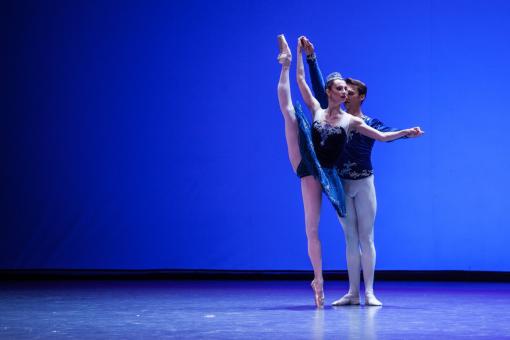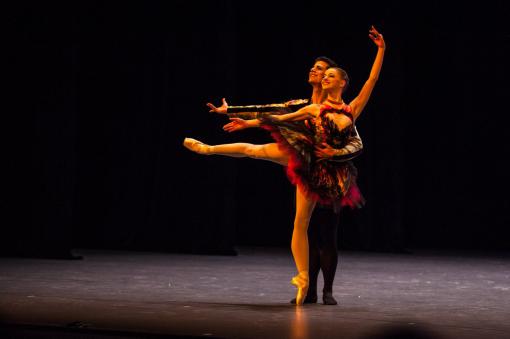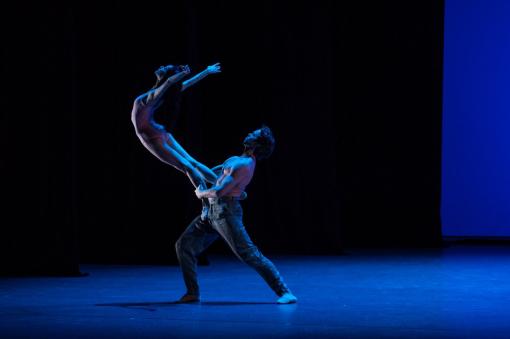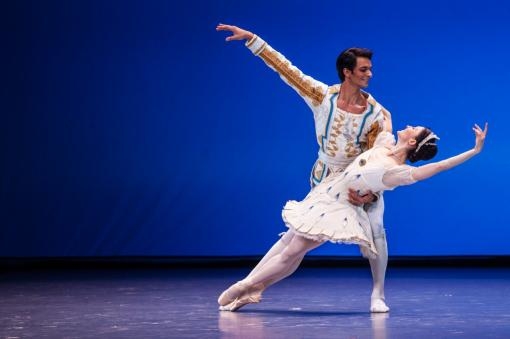That evening was not only festive, with an extraordinary list of performers, but especially from many points of view valuable and significant. The bright and shiny ballet gala show of the ensemble of the National Theatre Brno showed many important things at the Janáček Theatre yesterday. On the one hand, the gala concert celebrated the respectable one hundred years' anniversary of the ballet ensemble in Brno, and on the other hand also presented the city as a respected focal point of dance art, where the greatest stars of these days do not hesitate to arrive. And in this first-league competition, the domestic ensemble was successful in its match with the European best and brightest. If you add to this the truly storming and crowded auditorium of the Janáček Opera, meaning more than a thousand satisfied spectators, the above-mentioned artistic gains are accomplished.

Oksana Skorik and Philipp Stepin
There are not many European theatres that can boast such a long ballet tradition, which was established in Brno in 1919, i.e. in the newly founded republic. The second oldest ballet ensemble in the Czech Republic (a similar ensemble had been established at the Prague National Theatre at the very time of its foundation) began to write its history, a century of which was celebrated and commemorated yesterday in a truly dignified fashion. An historical excursion is not the objective of this review, but it is necessary to remember the name of the legendary Ivo Váňa Psota, who led the Brno ballet three times in succession and with his first engagement became the youngest artistic leader in the country. And just like today's artistic achievements, also the name of this man, speaking nine languages, a dancer and choreographer with a truly worldwide experience from Europe to North and South America, needs to be constantly brought to attention. Psota elevated Brno and the local ballet to worldliness, and this not only with the first production of one of the most successful dance dramas of the twentieth century – Prokofiev's ballet Romeo and Juliet in 1938. This is a primacy that the city can rightfully be proud of, must commemorate it as it rewrote cultural history.

Natascha Mair and Davide Dato
But back to the festive as well as triumphant evening. The exclusive concert gala programme with the participation of dance stars from the most important European ballet ensembles was interestingly broken into two halves. Until the intermission, the audience could enjoy the classical pas de deux; in the second half, contemporary choreographies were staged. The very nature of similar gala evenings implies that a selection of the best of white classics was featured, but it is interesting that as passionately as to samples from The Nutcracker, La Bayadére or Don Quixote, the audience loudly applauded the delicate and fragile choreography After the Rain to modern music by Arvo Pärt, which was danced in the choreography of Christopher Wheeldon by Lucia Lacarra, emeritous star of the Munich State Ballet, and Matthew Golding, emeritus superstar of the Royal Ballet London. Perhaps it is not even necessary to discuss in detail the extraordinary and anticipated dance mastery that this performing crème de la crème has offered. The ballet enthusiasts were sure to understand how logistically challenging it must have been to stage this gala show. In fact, ballet stars from Moscow, St. Petersburg, Vienna, Amsterdam, Budapest and of course soloists from the national theatres from Prague, Bratislava and Brno had a rendezvous in Brno yesterday. And it was this international dimension in particular that suited Brno, as well as all the breathtaking technically perfect jumps, pirouettes or brilliant dances on the tiptoes. The city is really heading for Europe with similar undertakings and confirms thus the international nature of dancing. Indeed, the Ballet of the National Theatre Brno is the second largest dance ensemble in the Czech Republic, currently engaging fifty dancers from twenty countries around the world.

Lucia Lararra and Matthew Golding
It is not possible to name all of them, even though the programme featured Russian stars such as principal dancer Oxana Skorik from Mariinsky Theatre in St. Petersburg, aside the first soloist Philipp Stepin from the same ensemble. Furthermore, Diana Kosyreva, protagonist of the Hungarian National Ballet in Budapest, and the leading soloist of the Bolshoi Theatre in Moscow Igor Tsvirko. In addition to renowned dancers, young rising stars were also given space, such as the first soloist of the Royal Ballet London Cesar Corrales, and his London colleague Sarah Lamb. We do not experience such imports often in Brno and the audience really enthusiastically applauded for example the first soloists of the Vienna State Ballet, namely Natascha Mair and Davide Dato. Domestic first soloists Ivona Jeličová and Klaudia Radačovská, who danced their choreography for Delibes' famous Flower Duet , certainly were not lost in this stellar bunch. It was a successful choreographic work by the NdB's artistic director Mário Radačovský. And this issue of the program, as well as the final fragment Gnawa danced by the domestic performers, offered a modern choreography under which the great world-renowned giant Nacho Duato is signed. Everything showed that the Brno Ballet can afford to perform alongside the global first league. This will certainly be reflected not only in the atmosphere, but also in the justifiably proud and important self-confidence of the Brno Ballet. Thanks to all of the above, the only thing to be hollered towards the Brno Ballet and the last night's show can only be Bravo!
GALA 100 YEARS OF NdB BALLET
Saturday 25 January 2020 at Janáček Theatre
































No comment added yet..